18 What if I don’t know about the Developmental Stages?

Now is a good time to start learning.
You can start to learn about the Developmental Stages by reading the article “Love Affirmations: Build Self-Esteem in Children” (WE Issue 4 Volume 7, Number 5), which offers a description of developmental stages and unconditional love.
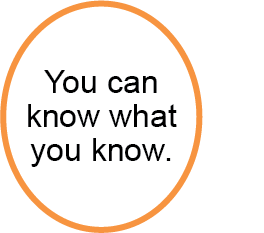
You can know what you know.
Doing — Stage 2
*
DIGGING DEEPER: read the article.
LOVE AFFIRMATIONS: Build Self-Esteem in Children
Self-esteem is the gift of love most of us would like to be able to give our children — the children we parent or teach or care about. We want our children to have self-confidence and to know that they are lovable. Some days we aren’t sure how to do that. Some days our own self-esteem is low and we wonder how to give what we do not have. Like yesterday, when I did something that I vowed I would never do because I hated when my parents did it. But I did it because the old way is “bred-in-the-bone” and I fall back on it when I am unsure of myself or when I have lost sight of other options. So what are my options? How can I build my internal resources?
What is self-esteem made of?
I can remember that children build self-esteem on a two-part foundation, the belief that they are lovable and the belief that they are capable. I need to instill both of these. I can also remember that I can’t parent perfectly; I only have to do it well enough for today.
We can increase our lovable resources and offer love without entanglement.
Love — unconditional love — should be every child’s birth right. It is the gift that you and I commit to give our children when we sign on for the job of parenting. “But,” you say, “I didn’t get much of it myself so I don’t have an instinct for how to do that. It is easy for me to be conditional, to say, ‘I love you when you please me.’” Don’t worry! We can learn new skills at any age. Or, you say, “If I haven’t been giving it, I will feel guilty or hopeless.” Don’t fret! Forgive yourself and start today. Human beings have an amazing ability to fill in what they did not get earlier. Or you say, “My children know that I love them,” or “I tell them every week; isn’t that enough?” Partly. We need to say it in lots of different ways. And, children learn more from what we do than from what we say. “Okay, okay,” you say, “I’m willing to say it and do it in new ways, but how?”
I love you, period
First of all, practice saying, “I love you” without any double-binding “whens” or “ifs” or “untils” or “as-long-as” or “except whens.” Just plain, “I love you.” Period. My mother used to say, “I love you when you are good.” Then she didn’t tell me how to be good! “I love you (period)” is the way we help our children get past some of the “I love you when …” double-binds that we experienced. Love is unconditional. All of the “whens” and “ifs” link love to approval and have caused some of us adults to doubt that straight unconditional love even exists. But it does, and as we feel it for our children, we can start to reclaim some of it for ourselves. We can practice in the shower saying, “I love myself, I love myself, I love myself” until it feels comfortable. We can let all of the old “I love you when you take care of me” and “I love you if you keep the family secrets” messages run down the drain and leave us with the pure, clean love that we want to offer our kids.
“But,” you ask, “Don’t we ever say anything more than ‘I love you’?” Yes, indeed. There are specific love messages or affirmations that we offer to let children know that we love them unconditionally and that we are glad they are doing the developmental tasks that they need to be doing for their age and stage. “I love you and it’s okay with me that you are doing your developmental tasks.” Here are the specific unconditional love messages that are important all of our lives, but that put special focus on the task of each developmental stage. I will address the stages one at a time. You can think about the messages and then decide on ways to let your children know, both by what you say and what you do, that these messages come from you with truth and sincerity. Let your children know that you want them to believe the messages and to incorporate these esteem-building foundation blocks.
I love you and I care for you willingly
The BEING task starts from birth to 6 months (and continues all of our lives.) The job is to decide to live, to “be.” When your infant has loving, willing care, he can learn to trust — to trust his own ability to call out and get his needs met and to trust his world. He especially needs to trust his special caregiving one(s), to be reached-out-to, to be loved and smiled at, talked to, hugged, and cherished. Each time you say these affirming words or do one of these actions you help your infant build a firm ground of self-esteem. 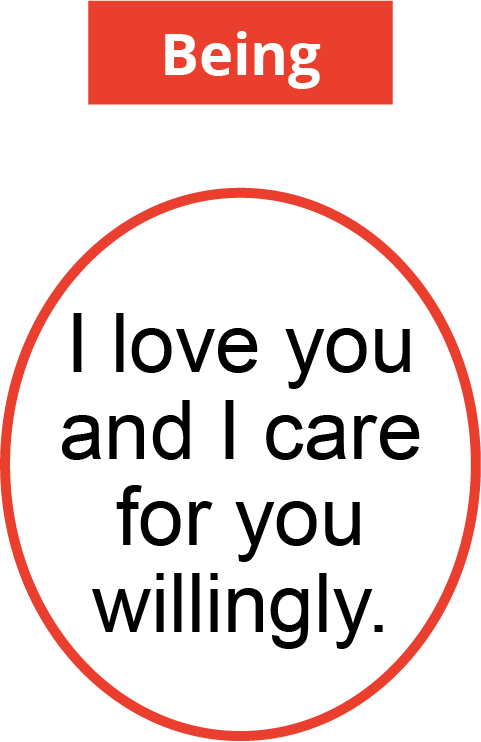
“But,” you say, “How can I let him know I care for him willingly when he has colic and I have an acute case of fatigue and guilt, and want to quit?” Do what you can for him. Have him checked by your doctor and try all of the medical suggestions. Tell him. Say, “Baby boy, I love you and I want to help and right now I don’t know what to do and I am tired and grumpy, but underneath all that I want you to know that I love you and I wish you didn’t hurt.” Then get someone else to care for him for an evening while you get out and have some relief and some fun. Care for yourself. Continue to say and believe this affirmation for him and for yourself for the rest of your lives.
I love you when you are active and when you are quiet
The DOING task starts from 6 to 18 months (and continues all of our lives.) At this age your child separates from your lap and moves out to explore her world. Not the complex world of politics, philosophy, or television, but the immediate world of sights, sounds, tastes, textures, shapes, sizes and places. How can you prepare this world for her? Hopefully, she will have one or two rooms in which to do her exploring freely, with firm gates protecting her from rooms that have the hazards of grown-up comforts. Remove everything that would be unsafe for her and put safety plugs in the electric outlets. Can she pound a toy on the coffee table to find out how that feels and sounds? If not, move the “good” coffee table behind the gate and get one she can pound and climb on. Think of things to put on the table for her — objects that are round, square, smooth, rough, cool, warm, colorful, noisy, or quiet, and all sturdy or dispensable pots, pans, boxes, old magazines, simple toys. She needs things to pile and stack and she needs safe places she can climb on and roll off. “I love you when you are active.”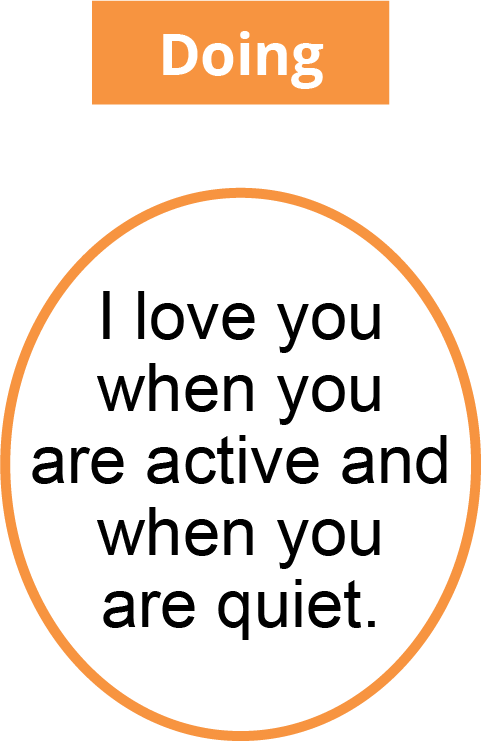
She also needs to have you (or someone) available so she can crawl up and have a lap-sit and a thumb-suck or sometimes just tug on your leg and get a pat and a greeting. Sometimes, just when neighbors come and you want them to see her perform, she gets fussy and needs to rest. “I love you when you are quiet.” Let her rest. The neighbors can see her later.
All of the ways that you prepare a safe, stimulating environment for her help her lay down the belief that she is lovable and capable — essential building blocks for self-esteem and for trusting her senses later on in a way that will help her achieve in school. This is a busy time for her and for you. Make the effort to get plenty of rest. Build the support system you need to swap or buy child care so you can have some grown-up time away from your busy explorer. Take care of yourself too.
You can become separate from me and I will continue to love you
The THINKING stage starts from 18 months to 3 years (and continues all of our lives.) During this stage, your child continues to explore and enjoy his environment. He also begins to focus on you and to explore some new ways of relating to you. He needs to find out how you respond to anger, to contrariness, and to his insisting on doing things his way. Some children do this with great gusto and many tantrums. Others are more easy going. Either way, your child is learning to think for himself in preparation for becoming independent and responsible for himself later on. He needs to take a position contrary to you and to be sure that you will still continue to love him unconditionally. He needs to practice saying no and to have you accept his no and not make him hold to it. Maybe Nancy Reagan would not have had to admonish so many of us to “Just Say No to Drugs!” if we had been allowed to practice our no-saying fully and freely as 2-year-olds. When we are older than 2, we can re-learn this skill, but 2 is the natural and easy time to learn it. 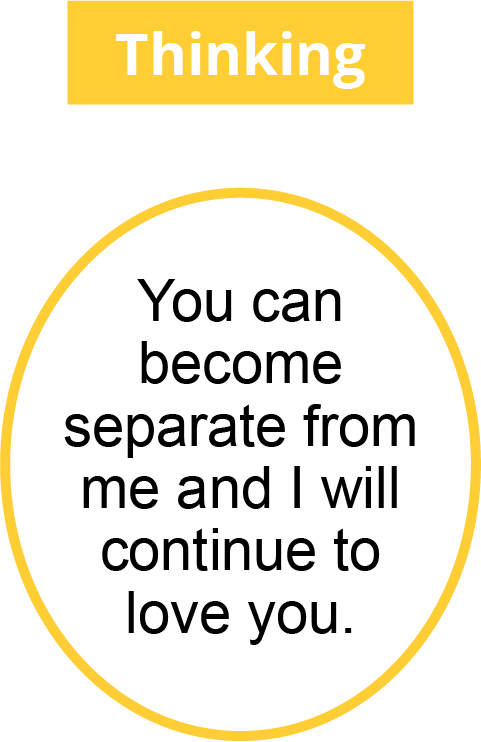
You can insist that a few safety rules be followed and continue to make the decisions about what is good for and safe for the child. He needs you to not give in to his tantrums or he will expect to get what he wants by overpowering other people. He needs you to not overpower his tantrums or he will come to believe that he is powerless. When you act bored with tantrums and insist that he start to use cause and effect thinking, and that he use words for what he wants, he learns to think for himself.
Some of us need breaks from children (and adults) who are practicing how to say no, especially if we grew up in families where we were deprived of the opportunity to say no or were taught that it was wrong. If we are just regaining that skill ourselves, we get tense about it at times, but the effort is worth it. Think what a great self-esteem building skill it is to be able to say “no” freely.
I love who you are
The IDENTITY & POWER stage starts at 3 to 6 years (and continues all of our lives.) “I love who you are.” What an astounding message this is for those of us who depended on “doing” for our okay-ness. “I love who you are.” Roll it over your tongue. Repeat it, emphasizing a different word each time. Let it in. If you don’t believe it (yet) for yourself, you will need to take special care to offer it to your child. “I love who you are.” That is separate from what you do, how you look, what you say, how you smell. I love you for being you — you are not a projection of me. You do not have to be like me or different from me — you can be you.
And what a broad experience of practicing “I love who you are” the 3- to 6-year-old offers us! One day she is a fairy and the next day a dog, a fire fighter, a carpenter, a teacher, a Mom or a Dad, as she tries on different identities in her quest for roles that fit her. She may still have some 2-year-old testing to do, but mainly she is figuring out who she is in relationship to other people and how to be powerful with them.
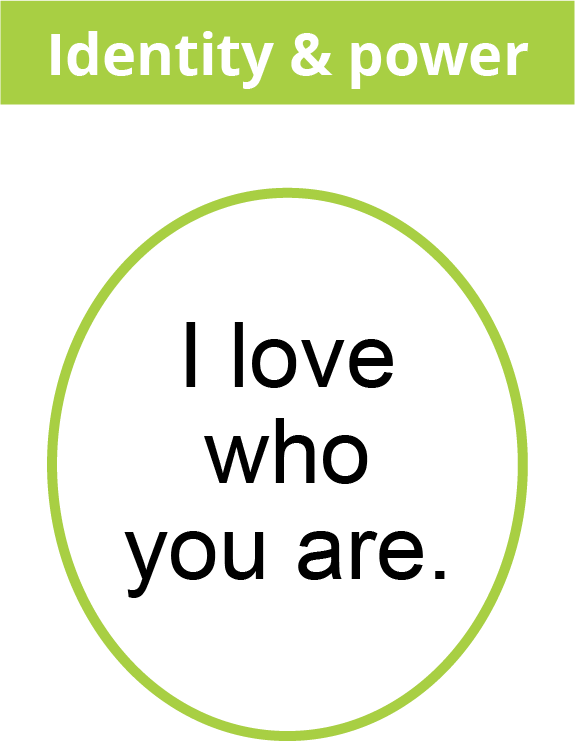 Since she is also busy increasing her power by learning skills, this is a natural time for you to start teaching her some social manners. Her questions and demands may seem incessant. At 3 she is asking, “Why?” at 4 insisting, “It’s dumb and I hate it,” at 5, “How does it work?” In order not to inadvertently teach her to be manipulative or aggressive, you need to keep your interactions and feelings straight with her. Telling her to be good may scare her, or confuse her, but it does not tell her what to do. Give her specific directions. “Put your toys in the basket.” “Here’s how to pet the kitty gently.” “Now is the time to say ‘thank you’.” “In five minutes it will be time to go. Then I will tell you to get your coat and put it on.” “When you step on my foot it hurts and I get angry. Stand here instead.”
Since she is also busy increasing her power by learning skills, this is a natural time for you to start teaching her some social manners. Her questions and demands may seem incessant. At 3 she is asking, “Why?” at 4 insisting, “It’s dumb and I hate it,” at 5, “How does it work?” In order not to inadvertently teach her to be manipulative or aggressive, you need to keep your interactions and feelings straight with her. Telling her to be good may scare her, or confuse her, but it does not tell her what to do. Give her specific directions. “Put your toys in the basket.” “Here’s how to pet the kitty gently.” “Now is the time to say ‘thank you’.” “In five minutes it will be time to go. Then I will tell you to get your coat and put it on.” “When you step on my foot it hurts and I get angry. Stand here instead.”
All of the time you are supporting her doing and enjoying her role exploration and encouraging her imagination, you are fostering her self-esteem by letting her know in many different ways, “I love who you are.”
I love you even when we differ; I love growing with you
The STRUCTURE stage starts at 6 to 12 years (and continues all of our lives.) During the grade school years your child is busy practicing and learning skills. He learns physical, mental, social and emotional skills, and spiritual values, and some of these will need to be different from ours. He takes more and more responsibility for his own self-esteem.
Sometimes he pursues a variety of interests with an intensity that is amazing to adults. He may rescue a baby squirrel (social, nurturing skills), play hockey (physical, social skills), consider plate tectonics (mental), bug his sister (social and emotional), decide whether to steal something with his friends (spiritual, social, emotional, mental), eat innumerable snacks 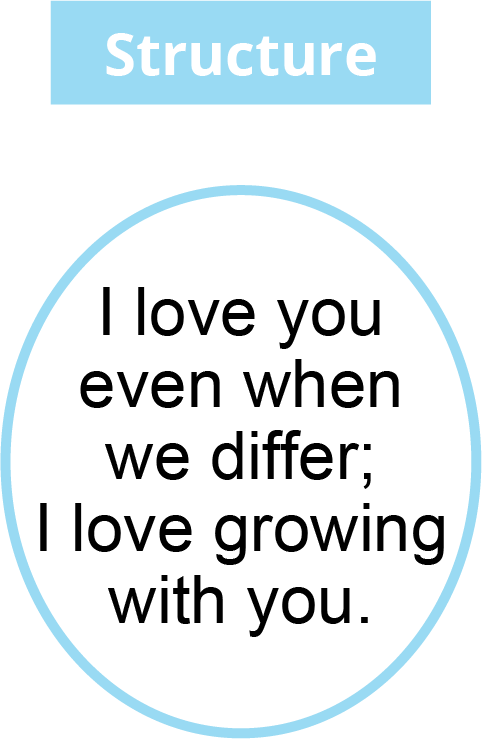 (physical), do or forget to do his chores, (mental, social), argue with you (emotional, mental, social), and deal with his hurt and anger that his best friend did him wrong (social, emotional and spiritual). Meanwhile, you and I are wishing he would be quiet, scrape his shoes, be polite, clean his room, and not hassle.
(physical), do or forget to do his chores, (mental, social), argue with you (emotional, mental, social), and deal with his hurt and anger that his best friend did him wrong (social, emotional and spiritual). Meanwhile, you and I are wishing he would be quiet, scrape his shoes, be polite, clean his room, and not hassle.
So you help him build his own self-esteem by exposing him to a wide variety of skill-building situations. You are clear about the family rules, negotiating the negotiable ones and enforcing the non-negotiable ones in a matter-of-fact, non-shaming way. Avoid, “You can’t do that, you don’t do that well enough. You will never get that right. You must be interested in my interests.” Instead say, “You can learn. I believe you can do it. I’ll watch and cheer. Would you like some help?” Remember that the hassling that these kids do is part of their important exploration of rules and which ones are firm and what happens when they break them. Hassling and arguing is not something we parents need to take personally, even though we may need a time-out now and then. We learn lots from these busy kids. “I love you even when we differ; I love growing with you.”
My love is always with you. I trust you to ask for my support
The IDENTITY, SEXUALITY & SEPARATION stage starts at 13 to 18 years (and continues all of our lives.) As youngsters move from being children to becoming adults, their theme song is “Sometimes I’m Up, Sometimes I’m Down.” They have to learn to handle the complex emotions that accompany their hormonal/sexual changes as they continue to separate from their parents and move toward an individual identity and a place among grown-ups.
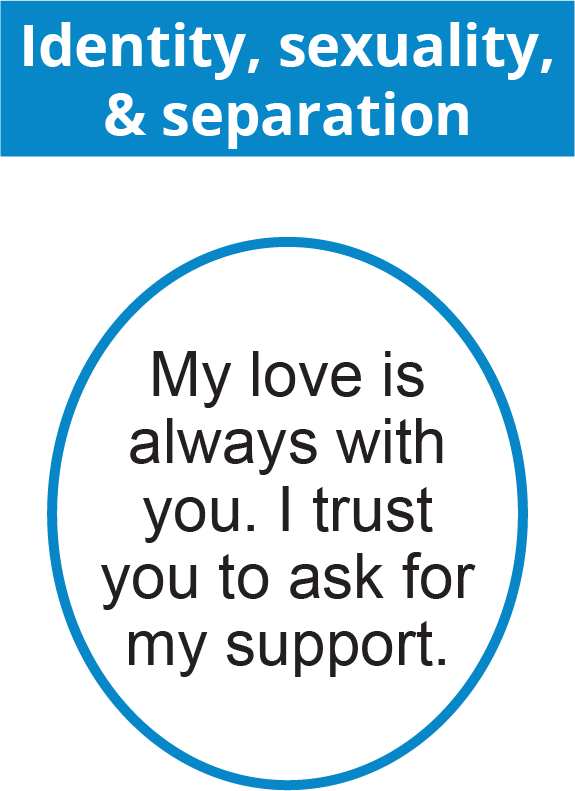 Supporting the development of self-esteem during this complex growth period sometimes taxes the patience and flexibility of parents. Adolescents often switch from an unsure, dependent attitude to responsible, mature behavior with amazing rapidity. No wonder parents are often out-of-phase with their teen, treating her like a baby when she wants to be a grown-up equal, and expecting her to be responsible when she is feeling confused or neglected. If this sounds familiar, forgive yourself. You can’t always know what mood she will be in. You can support her self-esteem by letting her know that you are there for her. “Do you want to talk about it?” “Can I help?” “I do care about you!”
Supporting the development of self-esteem during this complex growth period sometimes taxes the patience and flexibility of parents. Adolescents often switch from an unsure, dependent attitude to responsible, mature behavior with amazing rapidity. No wonder parents are often out-of-phase with their teen, treating her like a baby when she wants to be a grown-up equal, and expecting her to be responsible when she is feeling confused or neglected. If this sounds familiar, forgive yourself. You can’t always know what mood she will be in. You can support her self-esteem by letting her know that you are there for her. “Do you want to talk about it?” “Can I help?” “I do care about you!”
It helps to remember that teens revisit earlier developmental tasks to learn to do them in more grown-up ways. You can continue to give your teen all of the affirming messages from the earlier stages. You can continue to be in charge of the family rules with more and more help from her in setting, negotiating and enforcing them. “Yes, you must observe curfew,” or, “Yes, you must let us know when you will be home late. We worry about you.” “No, you may not take the car tonight. You left the gas tank empty last time you drove.” “No, you may not drink before you are legally of age.”
You can remember that the early adolescent often breaks rules because those rules are no longer functional for her, or she breaks them to see if you still care enough to maintain the family structure. When the late adolescent breaks rules it may be because she has been close to you and the world looks scary, so she helps herself move on by making the family situation so uncomfortable that she doesn’t want to stay home. Don’t take it personally. If you hold with the esteem-building words, actions and belief “My love is always with you. I trust you to ask for my support,” she will probably come back as a separated adult, participating in the family as a responsible, loving grown-up.

Feedback/Errata